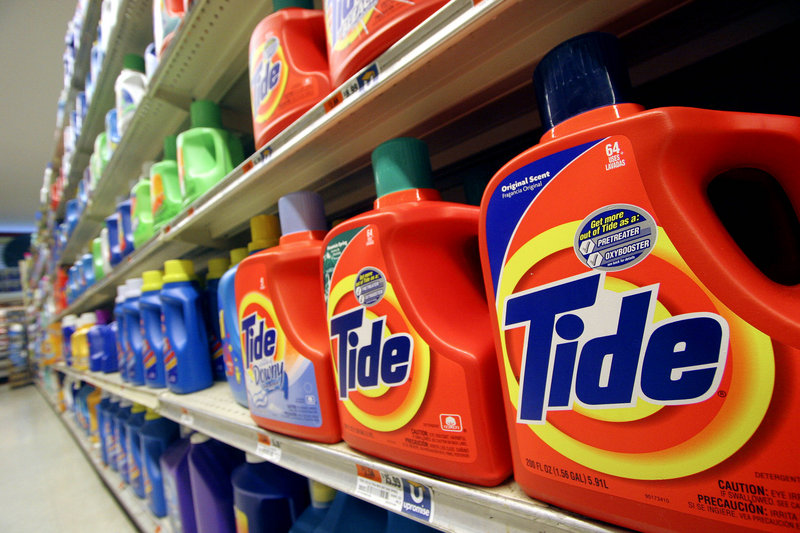WASHINGTON — When police in suburban Washington raided the home of a suspected drug dealer last fall, they found the cocaine, all right, but also something unusual on the man’s shelves: nearly 20 large bottles of liquid Tide laundry detergent.
It turns out his customers were paying for drugs not with cash, but with stolen Tide, police said.
Tide has become a hot commodity among thieves at supermarkets and drugstores in some parts of the country.
For a variety of reasons, the detergent in the familiar flame-orange bottle is well-suited for resale on the black market: Everybody needs laundry detergent, and Tide is the nation’s most popular brand. It’s expensive, selling for up to $20 for a large bottle at stores. And it doesn’t spoil.
One Safeway supermarket in Prince George’s County, Maryland, was losing thousands of dollars worth of Tide a week before police made more than two dozen arrests. In St. Paul, Minn., a man pleaded guilty to stealing more than $6,000 worth of the stuff from a Walmart and was sentenced to 90 days in jail. Police in Newport News, Va., and other cities around the country have reported a spike in thefts.
In the Washington area, some CVS pharmacies have been attaching electronic anti-theft tags to bottles. One CVS in a Dupont Circle neighborhood keeps Tide locked up behind glass.
Charlene Holton, a clerk at a busy 24-hour CVS in northwest Washington, has seen too many Tide thefts to count.
“It’s a hot item! It’s gotten out of hand,” Holton said. “They usually take maybe four, whatever they can carry out the door. We have to fight for that. It’s rough!”
The store has put electronic tags on its Tide, but that doesn’t stop the thieves, Holton said. They run out of the store with the detergent and remove the tags later with wire cutters.
Robert McCrie, a professor of security management at John Jay College of Criminal Justice in New York, said Tide is an ideal target for thieves, in part because high demand makes it easy to resell. The flat economy is a factor, as is the relatively low risk to criminals, he said.
“The idea of somebody making significant money as a drug pusher has been pretty much debunked on the streets. It’s risky and really low-profit,” he said. “Selling something like this represents little risk of physical danger.”
Drug dealers can resell the detergent to unscrupulous retailers such as corner stores, barbershops, even a nail salon. Everybody gets something out of the arrangement: the addict, who doesn’t have to scrounge up cash; the dealer, who can double or triple his profit on the drugs; and the retailer, who can acquire Tide for less than wholesale.
The maker of Tide, Procter & Gamble, sounded baffled about why the brand has gotten so much attention from thieves.
“We don’t have any insight as to why this has apparently happened,” P&G spokeswoman Sarah Pasquinucci said in an email, “but if so it is unfortunate.”
Send questions/comments to the editors.



Success. Please wait for the page to reload. If the page does not reload within 5 seconds, please refresh the page.
Enter your email and password to access comments.
Hi, to comment on stories you must . This profile is in addition to your subscription and website login.
Already have a commenting profile? .
Invalid username/password.
Please check your email to confirm and complete your registration.
Only subscribers are eligible to post comments. Please subscribe or login first for digital access. Here’s why.
Use the form below to reset your password. When you've submitted your account email, we will send an email with a reset code.